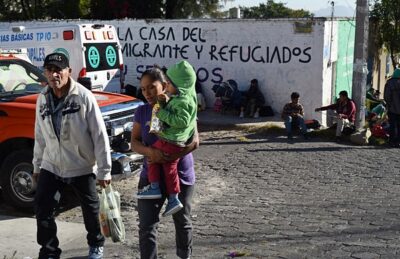
BOSTON – The Trump administration has unveiled a 161-page proposal to sharply limit asylum in the United States by narrowing eligibility, weighing many factors against petitioners, limiting due process, and allowing lower-level asylum officers to dismiss a petition as “frivolous.”
The proposal builds on three years of cruel and often illegal policies and practices that have deeply eroded asylum in America and put our country at odds with internationally accepted principles.
Though the proposal focuses on asylum-seekers, who request protection from within the U.S. or upon arrival, it could also affect the eligibility of refugees applying from abroad to be resettled here.
Eva A. Millona, president and CEO of the MIRA Coalition, and John Willshire-Carrera, president of the MIRA Board of Directors and co-managing director of the Harvard Immigration and Refugee Clinic at Greater Boston Legal Services, have the following statement:
“Turning its back on lessons of history and our obligations under U.S. and international law, the Trump administration is not only doubling down on its racist and reckless asylum policies, but seeking new restrictions that would violate human rights, deny asylum-seekers due process, and cost human lives.
“The proposed rules would deepen what is already a horrific humanitarian crisis at our southern border, and it would hurt countless Massachusetts families by making it near-impossible to reunite with their loved ones or to obtain asylum for those who already found safety here.
“We join immigrant and human rights advocates across America in vigorously opposing this proposal, and urge all people of conscience – especially those in positions of power – to do the same.”
Among other things, the proposal would:
• Further restrict access to asylum by more narrowly defining some existing bases for asylum, such as being part of a “particular social group” or due to one’s “political opinion.” It would foreclose claims based on gender, or on coercion by or refusal to join a guerrilla, a gang, or a terrorist group.
• Consider several factors as “significantly adverse” in deciding whether to grant asylum, including attempted or actual illegal entry; failure to seek protection in a pass-through country; and use of fraudulent documents to enter (unless coming directly from the country of persecution). Several more factors would be negatively weighed, including having spent more than 14 days in another country, having been present unlawfully for more than a year, and failing to file a tax return.
• Formally define the term “persecution” for the first time, and require not only evidence that “potentially persecutory laws or policies” exist, but that they are “widespread and systemic” or “were, or would be, applied to an applicant personally.”
• Allow asylum officers to deny claims based on assaults or torture by a public official if that person was “not acting under color of law,” even if the actions “cause pain and suffering that could rise to the severity of torture.” In other words, being persecuted or abused by a “rogue” public official would not be grounds for asylum.
• Deem evidence inadmissible in asylum cases if it is based on “pernicious cultural stereotypes” (e.g. that a country has a culture of machismo that makes women vulnerable to abuse, or entrenched homophobia). This includes “stereotypes based on race, religion, nationality, or gender.”
• Funnel asylum-seekers who are apprehended at or near a border or port of entry, who would normally be screened and then placed in regular immigration court proceedings, into a “streamlined proceeding” that makes it easier to quickly deny their claims.
• Allow asylum officers to judge whether an applicant was “aware of a high probability that his or her application was frivolous and deliberately avoided learning otherwise,” and deny the petition for that reason – a power currently held only by the Board of Immigration Appeals and immigration judges. It would also significantly expand the definition of “frivolous.”
